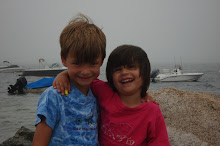 I'm reading Watching the Door: Drinking Up, Getting Down and Cheating Death in 1970s Belfast by Kevin Myers. This on the heels of Here, Bullet, a book of poems by Brian Turner, who served in Iraq after getting his MFA. Both are fascinating meditations on war.
I'm reading Watching the Door: Drinking Up, Getting Down and Cheating Death in 1970s Belfast by Kevin Myers. This on the heels of Here, Bullet, a book of poems by Brian Turner, who served in Iraq after getting his MFA. Both are fascinating meditations on war.The most striking contrast between the two works (although they probably shouldn't be compared at all as one is by a journalist observing one war and the other is written by a soldier who participated in another) is the distance the narrator has from the material. I often stress to students that they need distance from what they're writing, which can come in the form of time, or in the form of some narrative stance that is distant from what you were feeling when the events occurred. The tone of the work has to be separate from the mood you're trying to create. Myers has first the distance of time. The events he writes about occurred thirty years before the publication of this book. Also, he has taken on an extremely self-mocking stance as a narrator. He seems to truly dismayed by the young man he was, which is a difficult posture to maintain for 250 pages. The book opens with a description of him watching, calmly, while a group of gun toting boys ambushes a group of British soldiers, killing two of them. He explains that he never filed a story on that ambush in part because he could never have explained his presence there or the fact that he made no effort to intervene. This is the eternal moral quagmire for a reporter, one that seems to have haunted him ever since.
He also uses a lot of humor, which is not easy to do when you're writing about people killing each other. One of my favorite anecdotes so far is one about how the young Myers liked to invite friends up to Belfast from Dublin for a visit. In his hubris, he would take them out in his ratty old car at night on a tour of the most dangerous areas in Belfast, presumably so he could enjoy their fear. He describes one of these trips on a rainy night:
We drove through the control-zones between Catholic areas and Protestant areas, where no one but the security forces ever travelled at night--no one, that is, apart from me. Finally, I drove once again down towards Henry Taggart hall, turning off my headlights on my approach, as one always did. With only the sidelights on, the Renault eased over the speed ramps outside the sangar containing the sentry, and then right on cue it backfired--crack!--before stalling, stone dead. Jesus.Backfires had often attracted fatal gunfire in Belfast, and here was I perched on a speed ramp beside the most fired-at sentry post in Ireland. Grinning through inanely clenched teeth, I turned on the engine. Nothing happened. I tried again, pressing the accelerator hard; and the engine burst into life with a series of short, sharp explosive bangs that sounded precisely like the Browning 9mm my old shoulder-to-shoulder friend used to favor me with. Yards away, invisible, a British soldier was calmly making a decision about my life.The car moved forward, then backfired loudly, and stalled again. Jesus. What was I to do? I was nearly paralysed with terror, and outside it was dark dark dark, not just here, but across Belfast, and vertically upwards, a deep black to the very edge of the universe. And now in this fathomless vault, lit only by the sidelights on my car, with the frayed rubbers of my wipers forlornly trying to wipe the Niagara from my screen. I had to decide how I should manage this crisis. If I got out of the car, how would the sentry respond? In his shoes, what would I have done? In his shoes, I would already be dead behind the wheel.I had no choice but to start the engine again. My companion sat rigid as a corpse beside me, whispering in terror, his pallor dimly luminous in the utter dark. I turned the ignition, and the engine burst into life. Then I drove slowly away, sending a single sharp bang in farewell. Behind me stood a young working-class British soldier on sentry-go whose name I will never know, who was sitting in the most fired-on place in western Europe, and who had stoically and unflinchingly endured the gunfire-like sounds from a stationary car at point-blank range, without firing once. By such men is civilization made.
Most of what he describes in the book is terrifying, and appalling, as Myers intends. My one complaint about the American edition is that it includes no map of the region. I'm slowed by my need to google the locations and roads he mentions, hampered by my own ignorance. I suppose it's a small price to pay for this narrative.






No comments:
Post a Comment